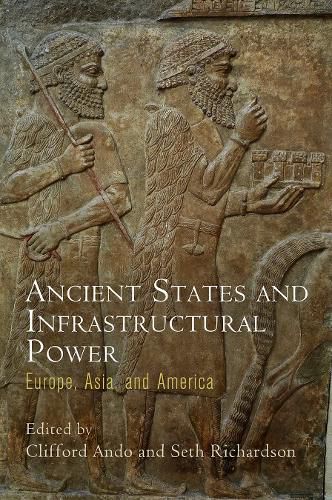Readings Newsletter
Become a Readings Member to make your shopping experience even easier.
Sign in or sign up for free!
You’re not far away from qualifying for FREE standard shipping within Australia
You’ve qualified for FREE standard shipping within Australia
The cart is loading…






While ancient states are often characterized in terms of the powers that they claimed to possess, the contributors to this book argue that they were in fact fundamentally weak, both in the exercise of force outside of war and in the infrastructural and regulatory powers that such force would, in theory, defend. In Ancient States and Infrastructural Power a distinguished group of scholars examines the ways in which early states built their territorial, legal, and political powers before they had the capabilities to enforce them.
The volume brings Greek and Roman historians together with specialists on early Mesopotamia, late antique Persia, ancient China, Visigothic Iberia, and the Inca empire to compare various models of state power across regional and disciplinary divisions. How did the polis become the body that regulates property rights? Why did Chinese and Persian states maintain aristocracies that sometimes challenged their autocracies? How did Babylon and Rome promote the state as the custodian of moral goods? In worlds without clear borders, how did societies from Rome to Byzantium come to share legal and social identities rooted in concepts of territory? From the Inca empire to Visigothic Iberia, why did tributary practices reinforce territorial ideas about membership?
Contributors address how states first claimed and developed the ability to delineate territory, promote laws, and establish political identity; and they investigate how the powers that states appropriated came to be seen as their natural and normal domain.
Contributors: Clifford Ando, R. Alan Covey, Damian Fernandez, Anthony Kaldellis, Emily Mackil, Richard Payne, Seth Richardson, Wang Haicheng, John Weisweiler.
$9.00 standard shipping within Australia
FREE standard shipping within Australia for orders over $100.00
Express & International shipping calculated at checkout
While ancient states are often characterized in terms of the powers that they claimed to possess, the contributors to this book argue that they were in fact fundamentally weak, both in the exercise of force outside of war and in the infrastructural and regulatory powers that such force would, in theory, defend. In Ancient States and Infrastructural Power a distinguished group of scholars examines the ways in which early states built their territorial, legal, and political powers before they had the capabilities to enforce them.
The volume brings Greek and Roman historians together with specialists on early Mesopotamia, late antique Persia, ancient China, Visigothic Iberia, and the Inca empire to compare various models of state power across regional and disciplinary divisions. How did the polis become the body that regulates property rights? Why did Chinese and Persian states maintain aristocracies that sometimes challenged their autocracies? How did Babylon and Rome promote the state as the custodian of moral goods? In worlds without clear borders, how did societies from Rome to Byzantium come to share legal and social identities rooted in concepts of territory? From the Inca empire to Visigothic Iberia, why did tributary practices reinforce territorial ideas about membership?
Contributors address how states first claimed and developed the ability to delineate territory, promote laws, and establish political identity; and they investigate how the powers that states appropriated came to be seen as their natural and normal domain.
Contributors: Clifford Ando, R. Alan Covey, Damian Fernandez, Anthony Kaldellis, Emily Mackil, Richard Payne, Seth Richardson, Wang Haicheng, John Weisweiler.